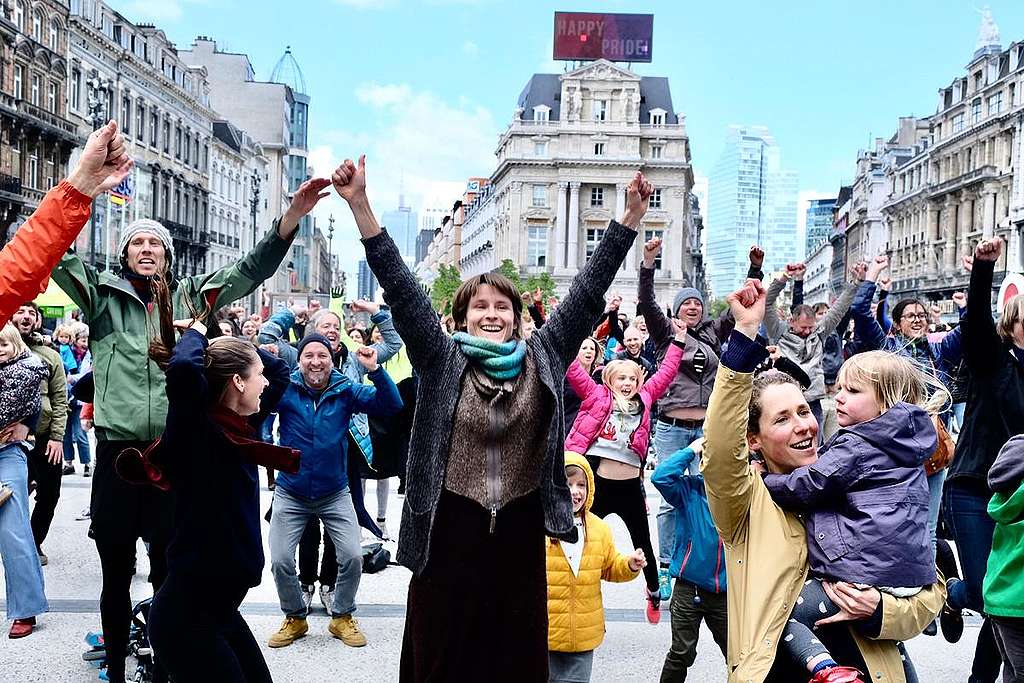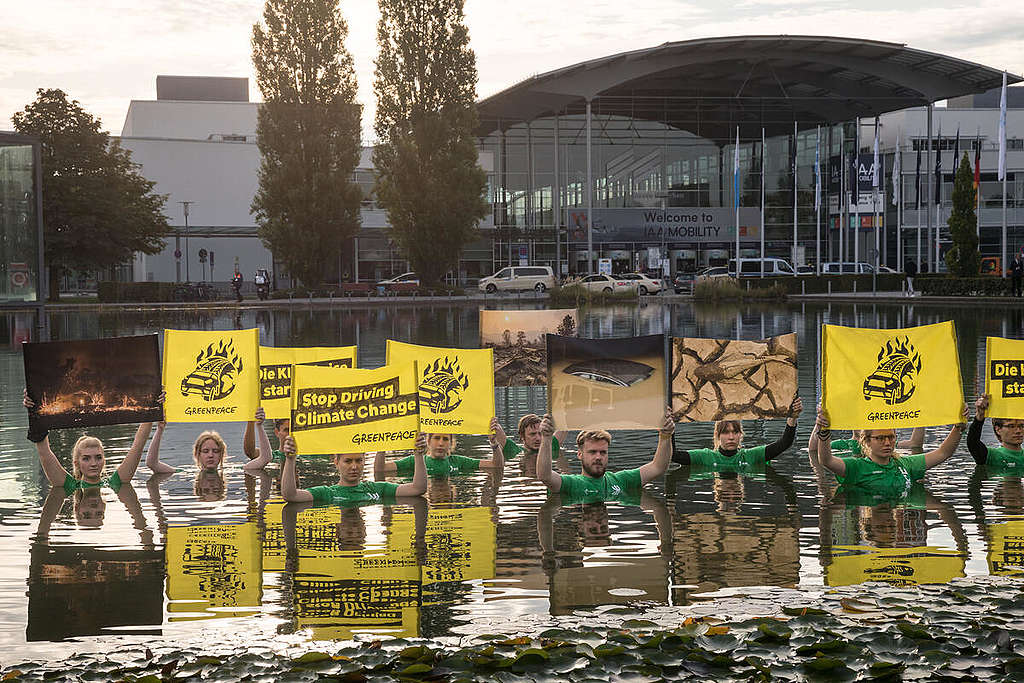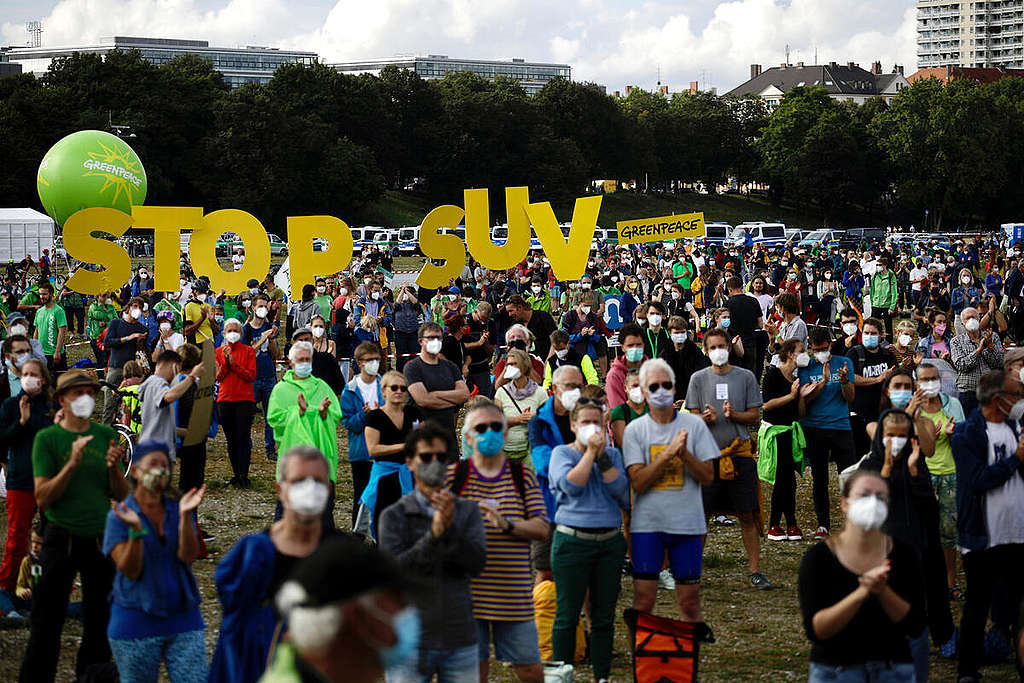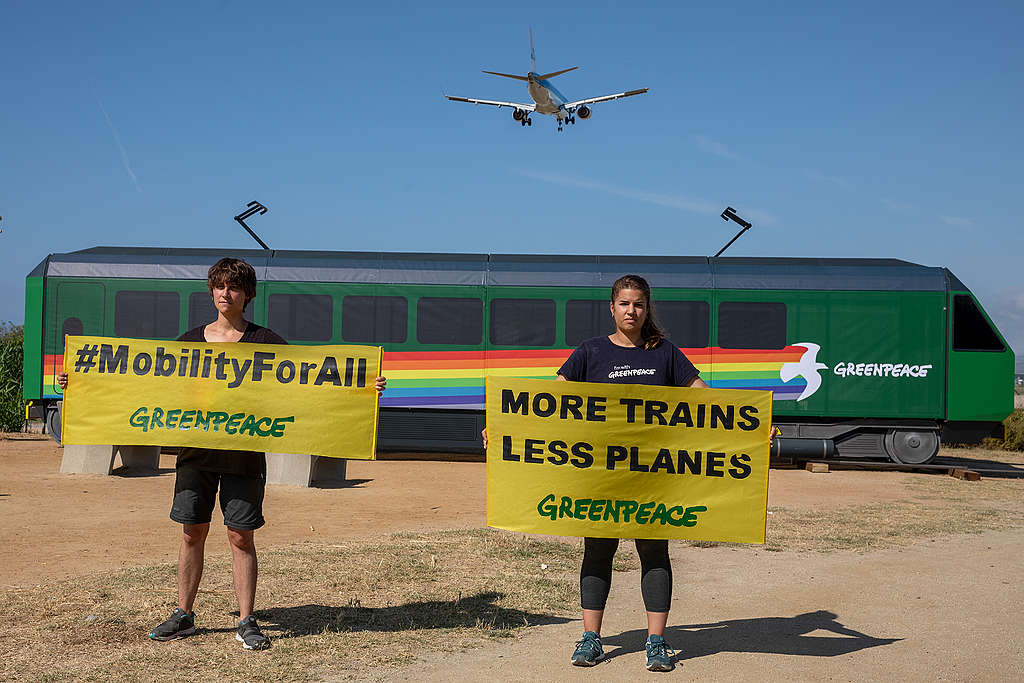This year’s Mobility Week is set to be Greenpeace’s biggest yet, as activists from across Europe and the world take to the streets en masse to demand real, meaningful change in urban mobility.
Starting on September 16 and ending on World Car-Free Day on September 22, Mobility Week calls on European cities and towns to rethink sustainable mobility. The transport sector is one of the biggest contributors to rising CO2 emissions and global warming (nearly 30% of CO2 emissions in the EU come from transport), and serious action must be taken now to help curb the climate crisis.

Mobility Week is a great opportunity for Greenpeace and its #MobilityForAll campaign to reinforce its demands on a national and international scale for inclusive cities that work for the benefit of all. These demands include:
- Car-free zones
- Better public transport, for example, electrification, more transport more often, more affordable, safer transport
- Sidewalks and public transport should be accessible to everyone, including people with physical disabilities
- Better support for shared mobility (from bike sharing to car sharing)
- Better cycling and walking infrastructure
- More green public spaces.
From Bucharest to Rome, Budapest to Brussels, the #MobilityForAll campaign will take its message of equitable mobility to the people and politicians with a number of impactful actions. Highlights include:
- Italy. Greenpeace Italy will occupy a number of parking lots in cities across the country and transform them into people-friendly spaces, with live music, yoga sessions, and urban gardens, among other attractions. September 17 is Park(ing) Day, a global day on which people across the world temporarily repurpose street parking spaces and convert them to tiny parks and places for art, play, and activism.
- Romania. Greenpeace Romania is co-hosting the 16th Critical Mass Bike Ride in Bucharest with three NGOs to demand 100 km of bike lanes in the capital by 2022, where there are over 1800 km of streets and currently only 20 km of bike lanes.
- Belgium. For Greenpeace Belgium, public transport is taking centre stage. The group is organising a mass protest against the Flemish government’s plans to cut costs on bus and tram services, which would cut approximately 5000 stops across Flanders.
- Hungary. The last day of Mobility Week is World Car-Free Day, which takes place on September 22, and is an annual action that closes busy streets to traffic, and instead opens them to pedestrians, cyclists and public transport. Greenpeace Hungary will be out across the capital, Budapest, on Car-Free Day, using reverse graffiti all over the city to expose the fact that more than 13,000 lives are lost in Hungary every year due to air pollution.
- Spain. Greenpeace Spain will join forces with other grassroots movements for a big citizen mobilisation in Barcelona, Madrid and Palma de Mallorca against government plans to expand both cities’ airports. The expansion plans fail to consider how an increase in the number of flights would impact Spain’s CO2 objectives.
Several high-profile activities have already taken place in anticipation of this year’s Mobility Week.

Earlier this month, activists from Greenpeace Germany took to the water to protest against the car industry at the International Auto Exhibition (IAA) in Munich. Holding aloft banners that showed the destruction wreaked by climate change-related extreme weather events in recent weeks, the campaigners immersed themselves in the lake in front of the exhibition site to demand an end to selling climate-damaging cars at the massive German auto show, which was attended by Chancellor Merkel.

In a further mass action at the International Auto Exhibition on September 11, people of all ages came together for a colourful bicycle ride and pedestrian demonstration to call for a halt to car-dominated transport policies. Demanding a mobility revolution that prioritises walking, cycling and local transport in inner cities, protesters called for politicians to free themselves from the clutches of the automotive industry and enable climate-friendly transport for all. The action was organised by an alliance of activist organisations under the motto #aussteigen (#getout).

Meanwhile, Greenpeace Spain was out in force at the Festival Cultura Inquieta in Madrid, an annual urban arts and culture festival. Campaigners erected a 12-foot long Greenpeace Model Train at the event to highlight the need for more investment in trains rather than planes. Campaigners are celebrating the suspension of plans to extend Barcelona El Prat Airport after it was announced that investment in the expansion has been put on hold.
This is just a small selection of the great events that are taking place this Mobility Week. Follow the #MobilityForAll hashtag on all social media platforms to keep up with what’s happening across Greenpeace this European Mobility Week!
Mobility For All is working in collaboration with allies to promote the benefits of alternative mobility for improved city life for all city dwellers, whatever their background or socioeconomic status.
Join the campaign! Follow the hashtag, #MobilityForAll and let’s work towards a radical transformation of cities.




